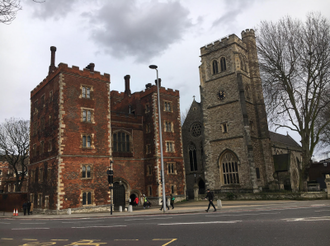Anglican Archbishops warn Government over new extremism definition

Lambeth Palace ICN/JS
Source: Archbishop of Canterbury
In a joint statement, the Archbishop of Canterbury and Archbishop of York warn the Government that its new extremism definition risks "disproportionately targeting Muslim communities" and "driving us apart".
They suggest labelling a multi-faceted problem as hateful extremism may "vilify the wrong people and risk yet more division".
Warning that the new definition may threaten freedom of speech, worship and protest, the Archbishops urge Government to reconsider and consult far more widely with all those affected.
Read their statement in full:
"In recent months, we have continued to witness growing division between different communities in this country - both in our towns and cities and online. Many of our Jewish and Muslim brothers and sisters have spoken about feeling unsafe while simply walking down the street, or attending their places of work and worship. These depressing developments not only undermine the cohesion of our society, but also threaten our country's rich diversity that should be so highly prized in 21st century Britain.
"How our leaders respond to this is far too important for a new definition of extremism to be its cure. Instead of providing clarity or striking a conciliatory tone, we think labelling a multi-faceted problem as hateful extremism may instead vilify the wrong people and risk yet more division. The new definition being proposed not only inadvertently threatens freedom of speech, but also the right to worship and peaceful protest - things that have been hard won and form the fabric of a civilised society. Crucially, it risks disproportionately targeting Muslim communities, who are already experiencing rising levels of hate and abuse.
"We are concerned - like so many others - by its implications for public life. We join calls for the Government to reconsider its approach and instead have a broad-based conversation with all those who it will affect. The Church of England would be very willing to fulfil part of its historic role by sharing in facilitating that conversation. The UK has a proud history of welcoming people from all walks of life and celebrating diversity. We are a community of communities. Our leaders should cherish and promote that - and pursue policies that bring us together, not risk driving us apart."


















